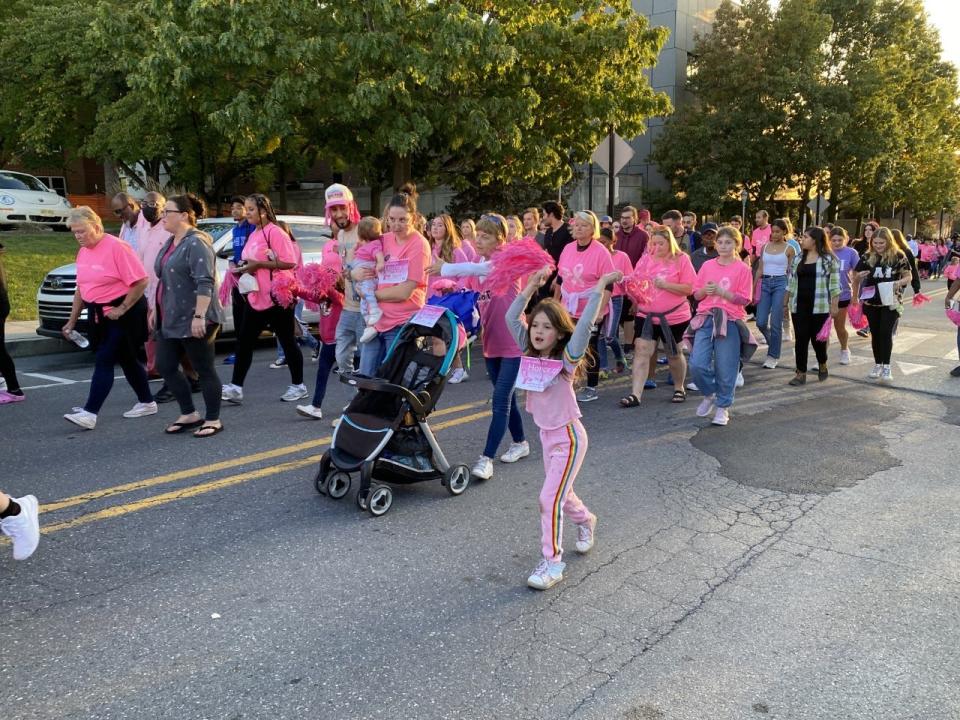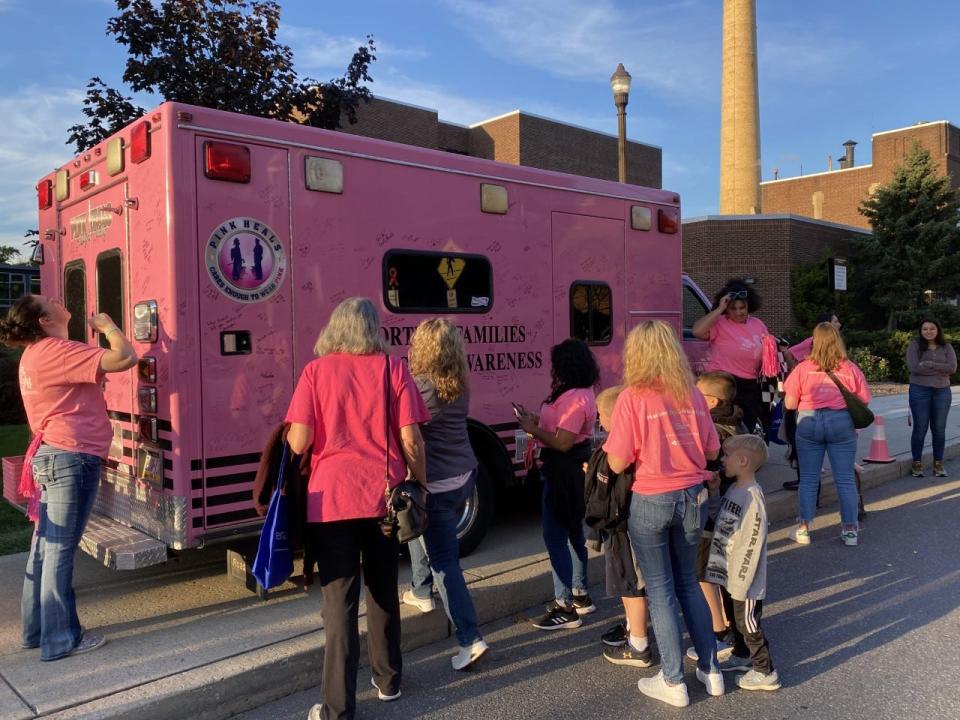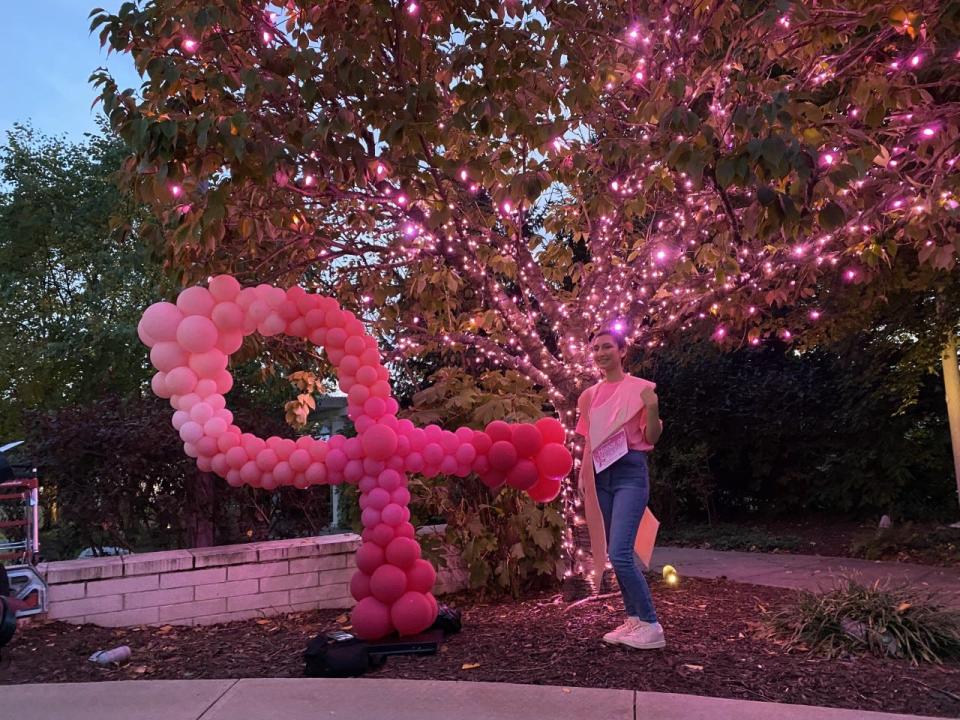'Forever grateful': In the Poconos, breast cancer awareness is just the start
A sea of pink flowed throughout the streets of East Stroudsburg on the evening of Oct. 6, with crowds of women, men, and children showing support for loved ones with breast cancer, honoring those lost to the disease, and raising awareness for more research to combat it.
Led by a pink ambulance and followed by a marching band, hundreds of people made their way from an information fair at East Stroudsburg University to Lehigh Valley Hospital-Pocono's Dale and Frances Hughes Cancer Center on East Brown Street for the annual Pink Light Walk.
Arriving at the Cancer Center, walkers embraced friends and family, imbuing that atmosphere with sense of positivity and hope.
Following a few refreshments and a couple numbers by the marching band, the crowd congregated in a space just beside the entrance to the facility, where they heard LVH-Pocono surgical oncologist Dr. Krista Bott offer practical advice and inspiration.
ESU graduate student and co-chair for Colleges Against Cancer Marcus Narcisse followed, wearing a t-shirt featuring a picture of his mother, who he had lost to brain cancer.
Narcisse told stories of her resilience and the fight she put up against cancer, along with his best friend, who he lost in his junior year of college. Despite his losses, or maybe, because of them, Narcisse has kept the fight against cancer going — something he stressed was a necessity for victory.
"All I can say is dark days turn to brighter days, and we all must be that shining light," Narcisse said. "We all must be that beacon of light. Cancer survivors don't need pity, they need the extra will to fight. That's why I'm alive today. I'm alive because of this person on my chest, I'm alive because of the support system in front of you guys. I would not be alive today if it wasn't for those reasons. Be the cure, find the cure."
The next speaker may have seemed out of sorts for many, a woman too young to have had to deal with the scourge of cancer. But Mariam Abdelhaq, Pink Light Honorary Chair, had faced it — and won. After a year of hell, she made it through to see the waves of supporters attend the walk, following her as she rode in the pink ambulance.
"I'm 23 years old, and I'm a patient here at the Dale and Frances Hughes Cancer Center. This month last year was the scariest time of my life. It started with me finding a lump in my left breast and ended with me being diagnosed with stage three breast cancer. One year later, and for me, the month of October no longer signifies fear. Instead, I approach this month with so much hope," Abdelhaq said, adding that she had rung the bell that celebrates victory for patients, stirring the crowd into a chorus of cheers and clapping.

According to the National Breast Cancer Foundation, Inc., in 2022, "an estimated 287,500 new cases of invasive breast cancer will be diagnosed in women in the U.S. as well as 51,400 new cases of non-invasive (in situ) breast cancer." The NBCF also notes that this year, an estimated 43,550 women will die from breast cancer in the United States alone.
Overall, about one in eight women will be diagnosed with breast cancer in their lifetimes.
In order to increase the odds of successful treatment for breast cancer, Bott noted the importance of keeping up with your health — whether you are a man or woman, whether you think it is a possibility or not.
"Everyone, even men, should practice breast self-awareness, which means to know what your breasts feel like, so you know if there are any changes. This includes self-exams, but with the knowledge that breast tissue is often lumpy. Know what you feel like so you know if something changes. Lumpiness is normal, but masses feel different than typical lumps. Breast self-awareness can be done at any time, but its helpful to make a routine, such as in the shower," Bott said.
Starting at age 40, Bott said mammograms should become an important part of yearly checkups; though for women who have a family history of breast cancer in a relative who was younger than 50 at diagnosis may opt to start mammograms earlier.
For such a prevalent problem, there are plenty of common misconceptions about breast cancer that can cause issues for patients and care providers.
According to Bott, most breast cancers happen in people who have no history of the condition. As people often look into their own family's background for an indication of their chance of getting cancer, it is important to realize that even if it never made an appearance in your family tree, it is still important to get checked.
It also helps to remember that cancer and its treatment are a unique road for each individual.
"No two breast cancers are alike. Treatment is individualized based on the person and characteristics of the tumor. Just because you know someone who had a certain treatment, doesn’t mean your treatment will be the same," Bott said.
Breast cancer is also usually painless, so just because something does not hurt does not mean you should not get it checked, Bott said, adding that mammograms — which do not require a special order from a physician — are particularly beneficial in the early stages of breast cancer, as "they allow us to find cancers when they are too small to feel," and "smaller tumors typically correlate to a lower stage, which means a higher cure rate."

And for those who are fearful of a costly treatment, there is help available, Bott said.
"There are programs in place to provide free or reduced cost screening mammograms to those with no insurance or those with very high deductible insurance," Bott said, noting that those interested can contact LVHN's Breast Health Services locations for details.
Other hospital and health networks, along with their doctors, nurses and staff, may be able to help those who are struggling with finances for treatment as well. In addition, the Susan G. Komen foundation provides information on assistance with medical bills, featuring numerous resources across the country that can provide a pivotal bit of assistance in a time of need.
While breast cancer awareness is one of the more widely-recognized illnesses across the world, there is still a tremendous lack of awareness when it comes to access to screenings. Bott noted many people skip mammograms due to a lack of insurance, or because they think they need a referral from a physician who they may not have seen in a long time.
"These aren’t viable excuses for not getting mammograms anymore, as you don’t need an order anymore, and we have programs to provide free mammograms to those who need them. It's just that people don’t know these programs exist. Breast cancer awareness initiatives seem to revolve around the month of October, but they are just as important the other 11 months of the year," Bott said.
Simply visiting a website from organizations like the National Breast Cancer Foundation or the Susan G. Komen foundation, or even your local hospital network's website — both LVHN and St. Luke's University Health Network have plenty of information online — can be the start of a life-saving journey.
For those who live far from imaging centers, Bott pointed out that LVHN has a mobile mammography bus that travels to rural areas for screenings. St. Luke's has specialized breast cancer centers in Stroudsburg, Center Valley, and Phillipsburg, New Jersey, along with a traveling team that meets at their Lehighton campus.
And when it comes time to explore options to fight cancer, whether that be chemotherapy, radiation therapy, hormone therapy, targeted therapy, or even participating in trial research studies, keeping in contact with your doctors and specialists while making your own specific plans is absolutely crucial.

No matter how one's journey through breast cancer begins, transpires, or ends, one of the most crucial elements of that voyage is steeped in support.
Just before lighting up a nearby tree to represent "the strength, the courage, the fight and the support of the village that is surrounds us tonight, and all the breast cancer warriors out there," Abdelhaq closed her speech by thanking all those who had joined her on her harrowing trip through breast cancer, and inspiring continued awareness in the fight to end the illness once and for all.
After all, there are are over 3.8 million breast cancer survivors in the United States, and if Abdelhaq and those who attended the Pink Light Walk have any say, that number will continue to rise.
"My mama and baba, who have had to sacrifice so much this past year to take care of me, I am forever grateful to have you in my life. I can't talk about my mom and dad without crying, I swear," Abdelhaq said. "I'm also thankful for everyone (who is) a part of the hospital staff for being a pillar of support that I never knew just how much I needed. You all have been an imperative part of my journey. You help pick me up from the lowest of lows, and you've cheered for me during the highs. Thank you so much for the work that you do not only for me but for every patient in this center."
This article originally appeared on Pocono Record: Poconos lead fight against breast cancer with Pink Light Walk

